Image
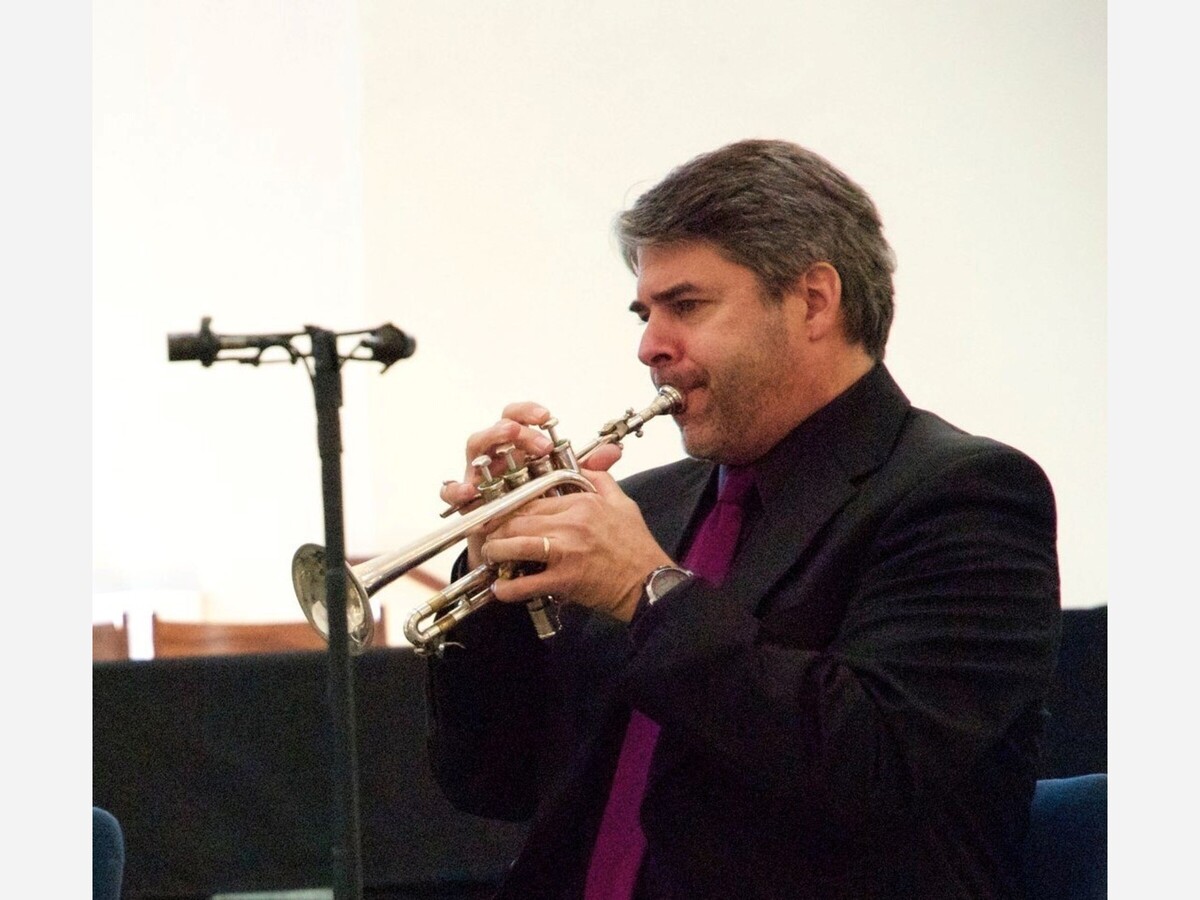

by Michael Strzelecki*
Brian Kuszyk lounged back in his kitchen chair, a model of relaxation and casualness. He wore blue jeans and a faded zipped-up navy hoodie. A full mat of salt-and-pepper hair swept left across this head and he sported a full, close-cropped beard. He laughed and joked persistently between sips of Coke Zero.
Brian’s easy-going, carefree nature vastly betrays his true stature - he is one of the most talented and accomplished trumpet players to pass through the Philadelphia area in our generation.
Brian is a 1980 graduate of Boyertown Area Senior High School. His curriculum vitae is lengthy, but worth appreciating. He is the principal trumpet player for Opera Philadelphia, the Philadelphia Ballet, the Delaware Symphony Orchestra, and The Academy of Vocal Arts Orchestra. He plays with the Chamber Orchestra of Philadelphia and occasionally sits in with the Philadelphia Orchestra. He is a member of Philadelphia Brass, a brass quintet that plays nationion-wide. And he is a Performance Faculty member in Princeton University’s Department of Music.
I recently met with Brian in his suburban Philadelphia home, on one of those streets where the houses are modest in size, but each is architecturally interesting. He has a front-yard cage for raising baby squirrels he found abandoned. A pair of gregarious soft-coated wheaten terriers greeted me at the door. I have known Brian since high school, where he would regularly beat me on the tennis court, and we have kept in touch through the years.
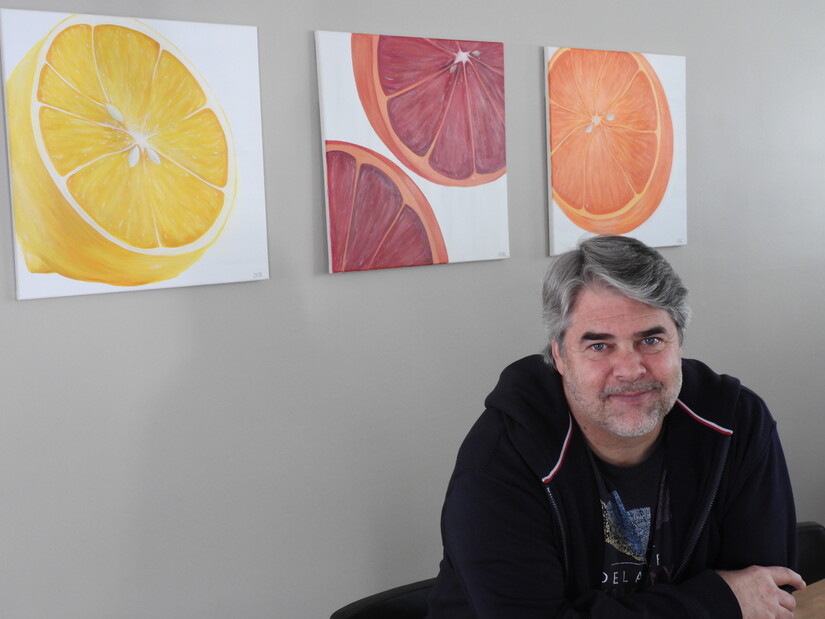
Brian, casual and relaxed, yet ready
My primary goal in the interview was to drill deeply into Brian’s psyche, to find out what drives someone to pursue such excellence and achieve at such a high level. But my first question to Brian was more utilitarian and very obvious: how in the world does one manage and coordinate eight jobs?
“Juggling so many commitments is a real puzzle,” Brian confessed. “There are lots of conflicts and anxious moments getting from one gig to the next on time.” Brian explained that he has always hit his “minimums” (the minimum amount of gigs you must contractually play for each entity each year) and he has, some would say miraculously, never been late for a gig, despite the best resistance of Philly traffic.
Brian continued by recalling his musical career arc, turbo-charged by having two supportive and encouraging parents who were local music teachers. (The auditorium at Boyertown Middle School West is named after Brian’s father, Don Kuszyk.) Brian banged on his first piano in second grade and by fourth grade had settled into the trumpet.
“The trumpet came pretty easy to me from the first time I started playing it,” he said. “And by eighth grade I knew that it was what I wanted to do.”
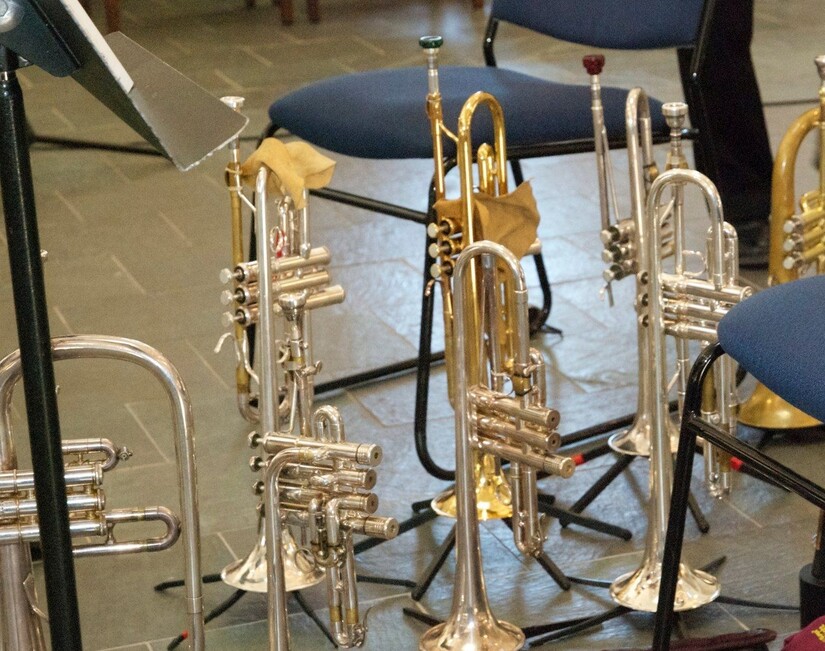
A view of the trumpet section
I asked Brian when he knew that he would make music performance a career. “There was no epiphany, it was just something I was good at,” he offered. “But when I started playing gigs for money, that is when I knew that I could make a career of it.” Brian was part of a family band in high school that played at weddings and dance gigs at places like SunnyBrook Ballroom, Elks lodges, and the Phoenixville Polish Club. He recalled getting paid $50 as a 7th grader to play in the Mummers Parade and thinking he was rich.
Brian participated in the full array of musical opportunities while in high school and then attended Temple University, one of the nation’s best music schools. He studied with the top musicians, including his mentor Seyour Rosenfeld, and achieved a degree in Music Performance.
Brian’s initial post-graduation goal was to try to be part of a full-time symphonic orchestra, and he auditioned for a few around the country. But his mindset and career path veered. He began getting freelance gigs and collecting positions with more intimate groups like The Chamber Orchestra of Philadelphia and the Philadelphia Ballet. He soon realized that he wanted more career diversity.
“I liked playing a variety of music,” he said. “But what I really enjoyed was playing with a variety of musicians with different groups. I liked getting to know a wide range of musicians, playing with different personalities every day.”
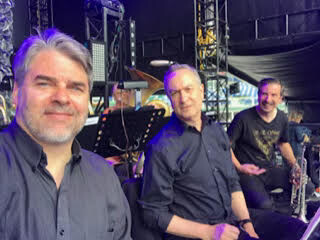
A gig playing with The Who at Citizens Band Park
Brian performs between 75 and 100 performances a year, many requiring multiple rehearsals. His preferred ballet is Prokofiev’s Romeo and Juliet (“I just love the harmonies and melodies”) and his favorite venue to play is the acoustically precise Carnegie Hall, in Manhattan.
Brian discussed his love-hate relationship with everyone’s favorite ballet - The Nutcracker.
“I have done over 500 performances of The Nutcracker,” he offered, a slight groan audible in his comment. “You may say that I am nutcrackered out. The problem is that it is not an easy gig for me to play. There is a difficult trumpet solo in the second act that I have to be on for every single performance. So I cannot relax.”
“Since there are so many double-days, The Nutcracker beats up my chops,” he lamented. “My facial muscles get so tired and sore from playing so much.”
Over his career, Brian has bumped elbows on stage with some of the world’s best classical musicians. Their names would not resonate with the non-musician readers, so instead I will list the celebrities he has performed with. They include Luciano Pavarotti, Andrea Bocelli, Barry Manilow, Patti Labelle, The Who, Roger Daltry, Tony Randall, Josh Grobin, Ben Folds, Bernadette Peters, and Elvis Costello. He has worked on various movie scores, and helped record an Emmy-winning NFL Films documentary movie on Johnny Unitas, as well as other NFL films.
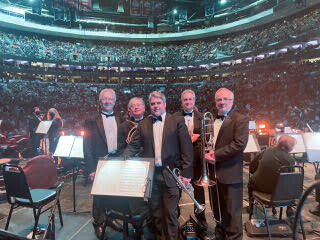
With his buddies playing for Andrea Bocelli at the Wells Fargo Center
Brian has traveled extensively throughout his music career. He has performed in 40 states as far-flung as Alaska and California. He’s played in England, Scotland, Portugal, and Germany. His Philadelphia Brass quintet twice visited Bolivia at the behest of the U.S. Department of State, teaching a Master Class there - performing concerts, teaching, giving musical demonstrations. They later worked to get more musical instruments in the country.
“Touring and playing Bolivia was a life event for me,” he smiled. “We played in towns high in the mountains and at Spanish missions in the lowlands.

Philadelphia Brass playing Santa Cruz, Bolivia
Brian admitted that being part of the Philadelphia Brass quintet is his most enjoyable music experience. “Those guys are my buddies,” he said. “And they are all such great musicians. Playing in the quintet is more rewarding for me since we get to choose what we play and how we play it. No conductor, it is a true democracy, with total respect for one another.” Philadelphia Brass has produced six original CDs and performed on a few others. Brian is its last remaining original member.
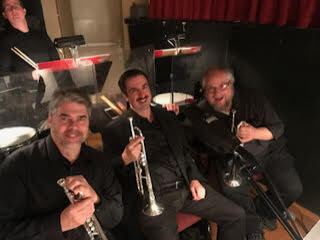
My wife and I saw Philadelphia Brass play at a church in Towson, Maryland, before Covid. Even with my atonal ear, I could hear the perfection in the music. But what jumped out more to us was the intimate chemistry of the five band members. Between songs, they would banter and kid and laugh with each other while introducing the next number. With great group chemistry comes outstanding performances.
In his limited spare time, Brian explores the backroads of southeastern Pennsylvania on his Kawasaki motorcycle. He enjoys reading non-fiction, sticking mostly to history books and biographies. He led me to his living room bookcase and shared with me his current read, a treatise on the history of colonialism in Latin America.
Brian is also an inveterate traveler. Brain’s wife, Laure, is French, and they have two children - Matthieu, who lives in New York City, and Isabelle, who is a student-athlete at Bryn Mawr College. They are all fluent in French. Each summer they spend a month in France visiting family and friends. They typically spend a week taking in the culture and yummy patisseries of Paris. Next is a couple of weeks in the bucolic southern French village of Fabregues, near Montpellier. They end their summer with a week of hiking and exploring the craggy French Alps, in and around the jigsaw-worthy hamlet of St. Martin de Belleville.
“I greatly look forward to our summers in France,” Brian said needlessly. “It’s a different country and culture that affords me a complete change of pace and life. It helps me recharge mentally and physically.”
“Besides; the food is exquisite,” he smiled.
While touring and gigging sound like an appealing lifestyle, Brian also shared some tribulations from the road. “While touring Alaska, during our first concert, our tuba player fell off the stage,” he explained. “Shattered his knee. He somehow finished the concert but ended up in the hospital and later was medevaced to a Seattle hospital. He almost lost his leg, it was so bad.”
He also spoke of the physical challenges of playing at high altitude in Bolivia. “We played one concert in a small town near La Paz, at about 15,000 feet up,” he said. “There was just no oxygen. I would stand up out of my chair and get winded. We turned purple trying to play our instruments. They actually had oxygen for us backstage.”
In my orbit of accomplished friends, Brian is one that may have risen to, and sustained, the highest level of accomplishment. I am enamored with the concept of pursuing excellence. My primary reason for interviewing Brian was to see what motivates him to perform at such a high level consistently, and how he has been able to stay at that level for decades.
“I am a perfectionist when it comes to the trumpet,” he declared. “That is my motivation. You have to be to play at this level. But at the same time, you are your own worst enemy since you are never satisfied in how you play. It is hard to let things go. We expect perfection every time we play but we are not perfect. I remain motivated to keep reaching for perfection.”
Brian explained that another source of motivation is his relationship with his musical peers. “You play for your colleagues more so than the audience,” he explained. “The audience will probably not catch most of your mistakes, but your colleagues know. I have a visceral fear of failing in front of my colleagues.”
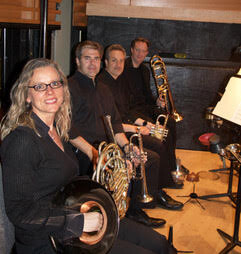
Opera Philadelphia pit at the Philadelphia Academy of Music
Brian, however, expressed great appreciation for audiences. “It is great to see people enjoying the performances and being part of helping them escape. When leaving the theater, we love to hear the excited chatter from the patrons talking about what they had just seen and heard.”
Brian elaborated on obstacles that have hindered his climb to the upper rungs of symphonic excellence. “The trumpet is the most physically demanding instrument in terms of endurance,” he stated. “Making it through performances physically is our nemesis. Playing the trumpet is endurance work.”
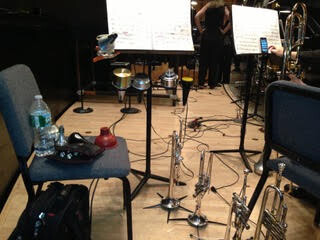
Trumpet set-up for crazy-hard opera
Brian explained the reason for this. He detailed how the facial muscles responsible for making the melodic sounds that come from the trumpet are difficult to train, and lose their muscle-memory quickly. He used terms like tongue articulation and embouchure. He likened playing trumpet at a high level to marathon training, where you build up, sustain the training unrelentingly, and then just hang on to survive.
He also explained that trumpeters of his level take no days off, because of how quickly you lose the required musculature of the vital facial muscles. “If I take a day off, it would take me three or four days to get to the level before my day off,” he said. “As a result, I perform or practice every day. I practice at home, in vans, in my tent while camping, in hotel rooms. I take my trumpet to France every year.” Brian said that he sometimes rehearses multiple times a day, up to six hours total.
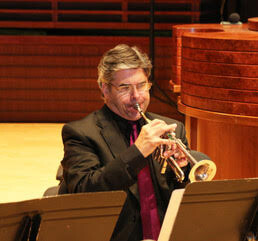
Playing Verizon Hall
I asked him the oddest place he has practiced. “Growing up, I used to work at the Fotomat shop, the tiny booth in the parking lot of the Town Plaza, in front of the Acme. I used to rehearse in there for hours when I wasn’t busy.”
One of my favorite reads is the sensational Malcolm Gladwell book, Outliers, which posits that, if you have a baseline of aptitude for some task, and you practice 10,000 hours at that task, you will become a master. I asked the master trumpeter whether he believes this theory, or whether just being a prodigy is enough. “I think there are prodigies, but when you get to a certain level, it just becomes who puts in the most time,” he opined.
“I think everyone at my level has an exceptional amount of natural musical ability,” Brian said. “They have the rhythm, the ear, the coordination. But at the end of the day, to separate the very top players, that’s where the extra work comes into play. Very little separates the top from one notch below. It’s a lot like training for sports. You have to train consistently and have the will to put in the extra work to make sure you are as prepared as possible.”
Another observation from Outliers is that certain exceptional performers came to be because of fortunate circumstances in their growth. For example, Gladwell notes that Bill Gates had the privilege of growing up next door to one of the few computer laboratories in the nation at that time, in an era that is now unimaginable. He was permitted to poke around the lab and work on its computers. This set off his career trajectory. If he had lived anywhere else, without access to this early computer lab, Windows may not exist today and Gates may be a world-class accountant or graphic designer instead.
Likewise, Brian grew up in fortunate circumstances. He had the favor of having parents (and two musically adept siblings) who understood the value of music performance and valued the hours spent rehearsing and gigging. “My parents were real role models,” he said. “From watching my parents, I learned how to practice and rehearse. I learned how to audition. I learned how to behave at gigs and interact with other musicians. I received constant encouragement and financial support. It was invaluable to my career having a musical family.”
Whenever you have an accomplished performer, it’s fun to circle back around to where it all began. This is what Brian had to say about Boyertown’s virtuoso music department: “Boyertown has an exceptionally strong music program. I was greatly shaped musically by my exposure to the music teachers at Boyertown. From Allison Smith and Dana Stauffer in elementary school, to Charlie Wieser and my dad Don Kuszyk, Liz Dietz and Mike Norris in junior high, to Arlen Saylor, Peg Lamb and Chuck Crummy in high school. They all were talented musicians and educators. I played in musicals, jazz bands, marching bands, concert bands, and sang in choruses and barbershop quartets. It was quite an extraordinary education and they all pushed us to be better. I can’t say enough about all of them.”
Our interview wound down because Brian had to drive into the city to perform in Opera Philadelphia’s interpretation of Carmina Burana. As he has been doing almost every day for decades, he knows that he and his colleagues will strive for the perfect performance. “It’s what we want as an orchestra,” he explained. “When you are playing at a high level, you just feel it, you sense it. It is a beautiful and magical experience.”
*Michael Strzelecki is a 1981 graduate of Boyertown Area Senior High School and a freelance travel and outdoors writer. He writes from his home in Baltimore, Maryland. He is author of Baltimore with Children and Urban Hikes in and Around Baltimore. His work has also appeared in the Baltimore Sun, Baltimore's Child, Running Times, Trail Runner, Ultrarunning, and Pennsylvania. He recently retired after a career as an analyst in energy regulation, on Capitol Hill, in Washington, DC.